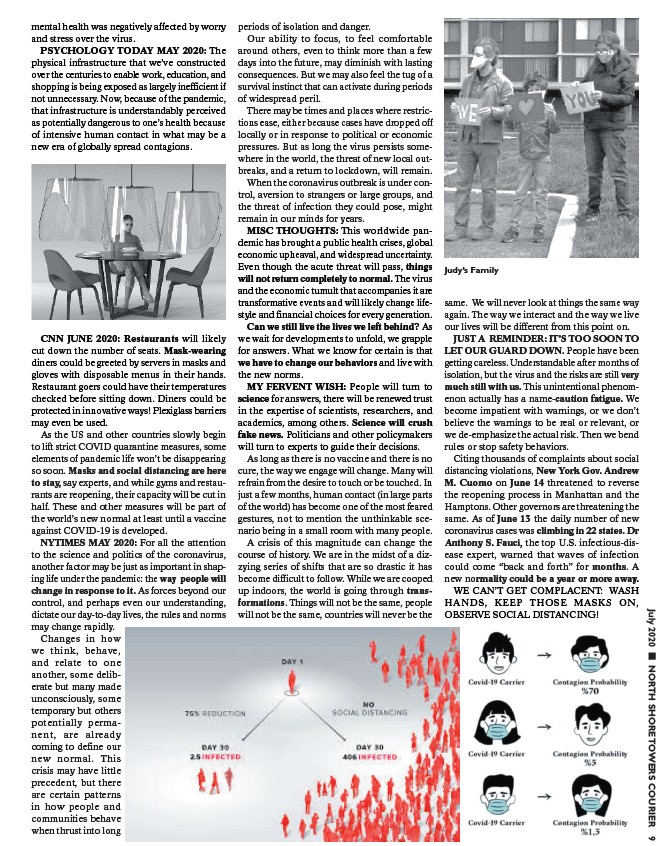
mental health was negatively affected by worry
and stress over the virus.
PSYCHOLOGY TODAY MAY 2020: The
physical infrastructure that we’ve constructed
over the centuries to enable work, education, and
shopping is being exposed as largely inefficient if
not unnecessary. Now, because of the pandemic,
that infrastructure is understandably perceived
as potentially dangerous to one’s health because
of intensive human contact in what may be a
new era of globally spread contagions.
CNN JUNE 2020: Restaurants will likely
cut down the number of seats. Mask-wearing
diners could be greeted by servers in masks and
gloves with disposable menus in their hands.
Restaurant goers could have their temperatures
checked before sitting down. Diners could be
protected in innovative ways! Plexiglass barriers
may even be used.
As the US and other countries slowly begin
to lift strict COVID quarantine measures, some
elements of pandemic life won’t be disappearing
so soon. Masks and social distancing are here
to stay, say experts, and while gyms and restau-rants
are reopening, their capacity will be cut in
half. These and other measures will be part of
the world’s new normal at least until a vaccine
against COVID-19 is developed.
NYTIMES MAY 2020: For all the attention
to the science and politics of the coronavirus,
another factor may be just as important in shap-ing
life under the pandemic: the way people will
change in response to it. As forces beyond our
control, and perhaps even our understanding,
dictate our day-to-day lives, the rules and norms
may change rapidly.
Changes in how
we think, behave,
and relate to one
another, some delib-erate
but many made
unconsciously, some
temporary but others
potentially perma-nent,
are already
coming to define our
new normal. This
crisis may have little
precedent, but there
are certain patterns
in how people and
communities behave
when thrust into long
periods of isolation and danger.
Our ability to focus, to feel comfortable
around others, even to think more than a few
days into the future, may diminish with lasting
consequences. But we may also feel the tug of a
survival instinct that can activate during periods
of widespread peril.
There may be times and places where restric-tions
ease, either because cases have dropped off
locally or in response to political or economic
pressures. But as long the virus persists some-where
in the world, the threat of new local out-breaks,
and a return to lockdown, will remain.
When the coronavirus outbreak is under con-trol,
aversion to strangers or large groups, and
the threat of infection they could pose, might
remain in our minds for years.
MISC THOUGHTS: This worldwide pan-demic
has brought a public health crises, global
economic upheaval, and widespread uncertainty.
Even though the acute threat will pass, things
will not return completely to normal. The virus
and the economic tumult that accompanies it are
transformative events and will likely change life-style
and financial choices for every generation.
Can we still live the lives we left behind? As
we wait for developments to unfold, we grapple
for answers. What we know for certain is that
we have to change our behaviors and live with
the new norms.
MY FERVENT WISH: People will turn to
science for answers, there will be renewed trust
in the expertise of scientists, researchers, and
academics, among others. Science will crush
fake news. Politicians and other policymakers
will turn to experts to guide their decisions.
As long as there is no vaccine and there is no
cure, the way we engage will change. Many will
refrain from the desire to touch or be touched. In
just a few months, human contact (in large parts
of the world) has become one of the most feared
gestures, not to mention the unthinkable sce-nario
being in a small room with many people.
A crisis of this magnitude can change the
course of history. We are in the midst of a diz-zying
series of shifts that are so drastic it has
become difficult to follow. While we are cooped
up indoors, the world is going through trans-formations.
Things will not be the same, people
will not be the same, countries will never be the
Judy’s Family
same. We will never look at things the same way
again. The way we interact and the way we live
our lives will be different from this point on.
JUST A REMINDER: IT’S TOO SOON TO
LET OUR GUARD DOWN. People have been
getting careless. Understandable after months of
isolation, but the virus and the risks are still very
much still with us. This unintentional phenom-enon
actually has a name-caution fatigue. We
become impatient with warnings, or we don’t
believe the warnings to be real or relevant, or
we de-emphasize the actual risk. Then we bend
rules or stop safety behaviors.
Citing thousands of complaints about social
distancing violations, New York Gov. Andrew
M. Cuomo on June 14 threatened to reverse
the reopening process in Manhattan and the
Hamptons. Other governors are threatening the
same. As of June 13 the daily number of new
coronavirus cases was climbing in 22 states. Dr
Anthony S. Fauci, the top U.S. infectious-dis-ease
expert, warned that waves of infection
could come “back and forth” for months. A
new normality could be a year or more away.
WE CAN’T GET COMPLACENT: WASH
HANDS, KEEP THOSE MASKS ON,
OBSERVE SOCIAL DISTANCING!
July 2020 ¢ NORTH SHORE TOWERS COURIER 9